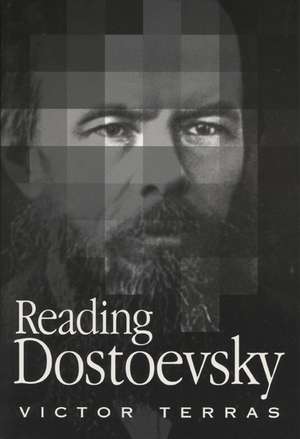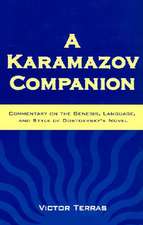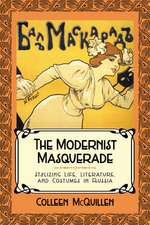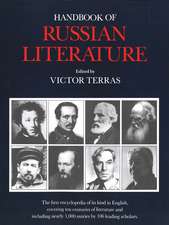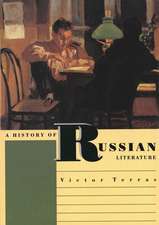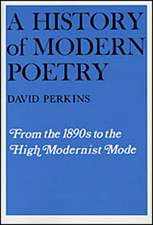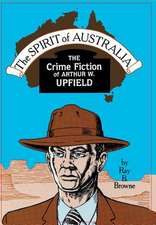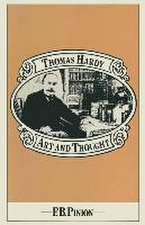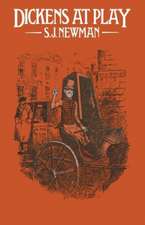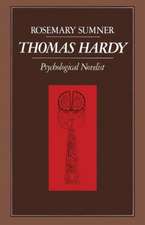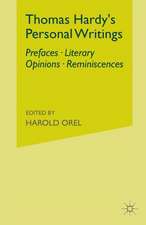Reading Dostoevsky
Autor Victor Terrasen Limba Engleză Paperback – 16 noi 1998
“A substantial contribution both to Dostoevsky scholarship and to scholarship on the novel. . . . The first book in quite a while to address itself to all of Dostoevsky’s opus, certainly a bold move that only someone of Terras’s stature could pull off.”—Gary Rosenshield, University of Madison–Wisconsin
Admirers have praised Fedor Dostoevsky as the Russian Shakespeare, while his critics have slighted his novels as merely cheap amusements. In this stimulating critical introduction to Dostoevsky’s fiction, literary scholar Victor Terras asks readers to draw their own conclusions about the nineteenth-century Russian writer. Discussing psychological, political, mythical, and philosophical approaches, Terras deftly guides readers through the range of diverse and even contradictory interpretations of Dostoevsky's rich novels.
Moving through the novelist's career, Terras presents a general analysis of the novel at issue, each chapter focusing on a particular aspect of Dostoevsky's art. He probes the form and style of Crime and Punishment, and explores the ambiguity of The Brothers Karamazov. Terras emphasizes the "markedness," of Dostoevsky's novels, their wealth of literary devices such as irony, literary allusions, scenic effects, puns, and witticisms.
Terras conveys the vital contradictions and ambiguities of the novels. In this informative, engaging literary study, Terras brings Dostoevsky and his art to life.
Admirers have praised Fedor Dostoevsky as the Russian Shakespeare, while his critics have slighted his novels as merely cheap amusements. In this stimulating critical introduction to Dostoevsky’s fiction, literary scholar Victor Terras asks readers to draw their own conclusions about the nineteenth-century Russian writer. Discussing psychological, political, mythical, and philosophical approaches, Terras deftly guides readers through the range of diverse and even contradictory interpretations of Dostoevsky's rich novels.
Moving through the novelist's career, Terras presents a general analysis of the novel at issue, each chapter focusing on a particular aspect of Dostoevsky's art. He probes the form and style of Crime and Punishment, and explores the ambiguity of The Brothers Karamazov. Terras emphasizes the "markedness," of Dostoevsky's novels, their wealth of literary devices such as irony, literary allusions, scenic effects, puns, and witticisms.
Terras conveys the vital contradictions and ambiguities of the novels. In this informative, engaging literary study, Terras brings Dostoevsky and his art to life.
Preț: 143.22 lei
Nou
Puncte Express: 215
Preț estimativ în valută:
27.41€ • 28.31$ • 22.81£
27.41€ • 28.31$ • 22.81£
Carte tipărită la comandă
Livrare economică 26 martie-09 aprilie
Preluare comenzi: 021 569.72.76
Specificații
ISBN-13: 9780299160548
ISBN-10: 0299160548
Pagini: 184
Dimensiuni: 152 x 229 x 13 mm
Greutate: 0.25 kg
Ediția:New.
Editura: University of Wisconsin Press
Colecția University of Wisconsin Press
ISBN-10: 0299160548
Pagini: 184
Dimensiuni: 152 x 229 x 13 mm
Greutate: 0.25 kg
Ediția:New.
Editura: University of Wisconsin Press
Colecția University of Wisconsin Press
Recenzii
“I know of no other book that approaches the art of Dostoevsky in the manner Terras does. And few if any that bring the artistic world of Dostoevsky in such a fine focus.”—Robert Louis Jackson, Yale University
Notă biografică
Victor Terras is Henry L. Goddard University Professor of Slavic Languages and Comparative Literature emeritus at Brown University. He is the author of several books, most recently Mayakovsky; The Idiot: An Interpretation; and A History of Russian Literature. A Karamazov Companion is also published by the University of Wisconsin Press. Terras has translated three volumes of Dostoevsky’s writing and edited seven volumes of Slavic scholarly texts.
Descriere
“A substantial contribution both to Dostoevsky scholarship and to scholarship on the novel. . . . The first book in quite a while to address itself to all of Dostoevsky’s opus, certainly a bold move that only someone of Terras’s stature could pull off.”—Gary Rosenshield, University of Madison–Wisconsin
Admirers have praised Fedor Dostoevsky as the Russian Shakespeare, while his critics have slighted his novels as merely cheap amusements. In this stimulating critical introduction to Dostoevsky’s fiction, literary scholar Victor Terras asks readers to draw their own conclusions about the nineteenth-century Russian writer. Discussing psychological, political, mythical, and philosophical approaches, Terras deftly guides readers through the range of diverse and even contradictory interpretations of Dostoevsky's rich novels.
Moving through the novelist's career, Terras presents a general analysis of the novel at issue, each chapter focusing on a particular aspect of Dostoevsky's art. He probes the form and style of Crime and Punishment, and explores the ambiguity of The Brothers Karamazov. Terras emphasizes the "markedness," of Dostoevsky's novels, their wealth of literary devices such as irony, literary allusions, scenic effects, puns, and witticisms.
Terras conveys the vital contradictions and ambiguities of the novels. In this informative, engaging literary study, Terras brings Dostoevsky and his art to life.
Admirers have praised Fedor Dostoevsky as the Russian Shakespeare, while his critics have slighted his novels as merely cheap amusements. In this stimulating critical introduction to Dostoevsky’s fiction, literary scholar Victor Terras asks readers to draw their own conclusions about the nineteenth-century Russian writer. Discussing psychological, political, mythical, and philosophical approaches, Terras deftly guides readers through the range of diverse and even contradictory interpretations of Dostoevsky's rich novels.
Moving through the novelist's career, Terras presents a general analysis of the novel at issue, each chapter focusing on a particular aspect of Dostoevsky's art. He probes the form and style of Crime and Punishment, and explores the ambiguity of The Brothers Karamazov. Terras emphasizes the "markedness," of Dostoevsky's novels, their wealth of literary devices such as irony, literary allusions, scenic effects, puns, and witticisms.
Terras conveys the vital contradictions and ambiguities of the novels. In this informative, engaging literary study, Terras brings Dostoevsky and his art to life.
